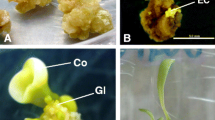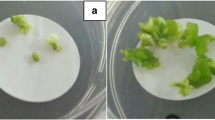Abstract
Obtaining citrus polyploids, especially from triploid individuals, is of great importance for genetic improvement programs, as they produce seedless fruits. Therefore, the aim of this study was to use flow cytometry analyses to identify polyploid individuals among tangerine-type seedlings originating from seeds germinated in vitro. Fruits were collected from 13 different genotypes in the municipality of Mucugê (state of Bahia, Brazil). The seeds were then removed and classified as developed (seeds with well-formed integument), underdeveloped (seeds with wrinkled integument) and small (seeds of 1/3 to 1/6 of normal size). After the integument was removed, the seeds were disinfected and introduced into a WPM culture medium, in which they remained for 120 days. After this period, the percentage of germinated seeds and growth variables were evaluated, and ploidy analysis was conducted using flow cytometry. The developed seeds displayed a higher germination rate (91.5%) than the others. The small and underdeveloped seeds resulted in a considerable frequency of spontaneous polyploids (11%), and one haploid plant was also obtained from the latter class.
Key message
The ploidy of 13 citrus genotypes was investigated using flow cytometry. In addition to polyploid plants that are of interest to breeding programs, there was the identification of a haploid plant.








Similar content being viewed by others
Data availability
All data generated were analyzed during this study and are included in this published article.
References
Aleza P, Juárez J, Hernández M, Pina JA, Ollitrault P, Navarro L (2009) Recovery and characterization of a Citrus clementina Hort. ex Tan. “Clemenules” haploid plant selected to establish the reference whole Citrus genome sequence. BMC Plant Biol 9(1):1–17
Aleza P, Juárez J, Cuenca J, Ollitrault P, Navarro L (2010) Recovery of citrus triploid hybrids by embryo rescue and flow cytometry from 2X × 2X sexual hybridisation and its application to extensive breeding programs. Plant Cell Rep 29(9):1023–1034. https://doi.org/10.1007/s00299-010-0888-7
Aleza P, Froelicher Y, Schwarz S, Agustí M, Hernández M, Juárez J, Luro F, Morillon R, Navarro L, Ollitrault P (2011) Tetraploidization events by chromosome doubling of nucellar cells are frequent in apomictic citrus and are dependent on genotype and environment. Ann Bot 108(1):37–50. https://doi.org/10.1093/aob/mcr099
Chae CW, Yun SH, Park JH, Kim MJ, Koh SW, Song KJ, Lee DH (2012) Frequency of spontaneous polyploids in monoembryonic Jeju native citrus species and some mandarin cultivars. J Life Sci 22(7):871–879. https://doi.org/10.5352/JLS.2012.22.7.871
Costa SN, Cortez PA, Almeida LA, Da H, Martins FM, Soares Filho W, Dos S, Coelho Filho MA, Gesteira A, Da S (2019) Triploid frequency of sexual hybridization and pollen and ovary development in mandarins. Braz J Bot 42(1):73–82. https://doi.org/10.1007/s40415-019-00513-6
Cuenca J, Garcia-Lor A, Navarro L, Aleza P (2018) Citrus genetics and breeding. In: Al-Khayri J, Jain S, Johnson D (eds) Advances in plant breeding strategies: fruits. Springer, Berlin, pp 403–436
Das A, Kumar K, Tribhuvan K, Das SS, Mishra M (2018) Development of haploid and double haploid in fruit crops-a review. Int J Curr Microbiol Appl Sci 7(5):2119–2132. https://doi.org/10.20546/ijcmas.2018.705.247
Doležel J, Greilhuber J, Suda J (2007) Estimation of nuclear DNA content in plants using flow cytometry. Nat Protoc 2(9):2233–2244. https://doi.org/10.1038/nprot.2007.310
Ferreira E B, Cavalcanti P P, Nogueira D A (2018) ExpDes.pt: pacote experimental designs (Portuguese). R package version 1.2.0. https://CRAN.R-project.org/package=ExpDes.pt
Germanà MA (1997) Haploidy in citrus. In: Jain SM, Sopory SK, Veilleux RE (eds) In vitro haploid production in higher plants. Kluwer, Dordrecht, pp 195–217
Germanà MA (2011) Anther culture for haploid and doubled haploid production. Plant Cell Tissue Organ Cult (PCTOC) 104(3):283–300. https://doi.org/10.1007/s11240-010-9852-z
Germanà MA, Chiancone B (2003) Improvement of Citrus clementina Hort. ex Tan. microspore-derived embryoid induction and regeneration. Plant Cell Rep 22(3):181–187. https://doi.org/10.1007/s00299-003-0669-7
Germanà MA, Wang YY, Barbagallo MG, Iannolino G, Crescimanno FG (1994) Recovery of haploid and diploid plantlets from anther culture of Citrus clementina Hort, ex Tan. and Citrus reticulata Blanco. J Hortic Sci 69(3):473–480. https://doi.org/10.1080/14620316.1994.11516478
Germanà MA, Chiancone B, Lain O, Testolin R (2005) Anther culture in Citrus clementina: a way to regenerate tri-haploids. Aust J Agric Res 56(8):839–845. https://doi.org/10.1071/AR05025
Gmitter FG, Chen C, Machado MA, De Ollitrault SAA (2012) Citrus genomics. Tree Genet Genomes 8(3):611–626. https://doi.org/10.1007/s11295-012-0499-2
Guerra D, Schifino-Wittmann MT, Schwarz SF, Weiler RL, Dahmer N, Souza PVDD (2016) Tetraploidization in citrus rootstocks: effect of genetic constitution and environment in chromosome duplication. Crop Breed Appl Biotechnol 16:35–41. https://doi.org/10.1590/1984-70332016v16n1a6
Guo WW, Liang WJ, Xie KD, Xia QM, Fu J, Guo DY, Xie ZZ, Wu XM, Xu Q, Yi HL, Deng XX (2016) Exploitation of polyploids from 39 citrus seedling populations. Acta Hort. https://doi.org/10.17660/ActaHortic.2016.1135.2
Krahulcová A, Rotreková O (2010) Use of flow cytometry in research on apomictic plants. Preslia 82(1):23–39
Lal C, Suneel S, Subhash K (2014) In vitro seed germination studies in citrus rootstocks. Ann Agri Bio Res 19(2):290–294
Lloyd G, Mccown B (1980) Use of microculture for production and improvement of Rhododendron spp. HortScience 15(3):416–417
Mendes MIS, Verde DSV, Ramos APS, Gesteira AS, Santos Soares Filho WS, Souza AS (2021) In vitro conservation of citrus rootstocks using paclobutrazol and analysis of plant viability and genetic stability. Sci Hortic 286:110231. https://doi.org/10.1016/j.scienta.2021.110231
Nukaya T, Sudo M, Yahata M, Nakajo Y, Ohta T, Yasuda K, Ohta T, Mukai H, Kunitake H (2019) Characteristics in autotetraploid kumquats (Fortunella spp.) induced by colchicine treatment to nucellar embryos and their utilization for triploid breeding. Sci Hortic 245:210–217. https://doi.org/10.1016/j.scienta.2018.10.015
Ollitrault P, Dambier D, Luro F, Froelicher Y (2008) Ploidy manipulation for breeding seedless triploid citrus. Plant Breed Rev. https://doi.org/10.1002/9780470380130.ch7
Padoan D, Germanà CB (2011) Occurrence of spontaneous triploids from small seeds of “Hernandina” Clementine. Acta Hortic 892:287–294. https://doi.org/10.17660/ActaHortic.2011.892.34
Povedano L, Henrique FH, Neto AT, Latado RR (2012) Obtenção de plantas tetraploides de citros visando a produção de frutos triploides sem sementes. Citrus Res Technol 33(2):65–74. https://doi.org/10.5935/2236-3122.20120008
R Core Team (2016) R: A language and environment for statistical computing. R Foundation for Statistical Computing, Vienna, Austria. https://www.r-project.org/.
Rewers M, Jedrzejczyk I, Rewicz A, Jakubska-Busse A (2021) Genome size diversity in rare, endangered, and protected orchids in Poland. Genes 12(4):563. https://doi.org/10.3390/genes12040563
Santiago RT (2017) Cultivo in vitro em auxílio à obtenção de tangerineiras triploides e propagação de porta-enxertos de citros. Universidade Federal do Recôncavo da Bahia, Dissertação
Schinor EH, De AFA, De Mourão Filho F (2011) In vitro organogenesis in some citrus species. Rev Bras Frutic 33(2):526–531. https://doi.org/10.1590/S0100-29452011005000050
Souza JD, De Rodrigues V, Barigah T, Ollitrault P, Da GA (2016) Whole genome expression and hydraulic architecture of diploid and doubled diploid citrus seedlings in intra and interspecific contexts. Citrus Res Technol 37(2):206–210. https://doi.org/10.4322/crt.ICC054
Toolapong P, Komatsu H, Iwamasa M (1996) Triploids and haploid progenies derived from small seeds of “Banpeiyu”, a pummelo, crossed with “Ruby Red” grapefruit. J Jpn Soc Hortic Sci 65(2):255–260. https://doi.org/10.2503/jjshs.65.255
Usman M, Saeed T, Khan MM, Fatima B (2006) Occurrence of spontaneous polyploids in Citrus. Hortic Sci 33(3):124–129. https://doi.org/10.17221/3751-HORTSCI
Veilleux RE (1994) Development of new cultivars via anther culture. HortScience 29(11):1238–1241
Wu-Jun L, Xie K, Guo D, Xie Z, Xu Q, Yi H, Guo W (2014) Spontaneous generation and SSR characterization of polyploids from ten citrus cultivars. Acta Hortic Sin 41(3):409
Zhang J, Zhang M, Deng X (2007) Obtaining autotetraploids in vitro at a high frequency in Citrus sinensis. Plant Cell Tiss Organ Cult 89:211–216. https://doi.org/10.1007/s11240-007-9240-5
Funding
To CAPES and FAPESB, for their financial support for the scholarships of the students involved in the study. To Embrapa Mandioca e Fruticultura, for providing the physical structure and financial support for the development of the study. To UESC (Universidade Estadual de Santa Cruz), specifically to the Graduate Program in Crop Production, for supporting the development of the thesis from which this article was extracted.
Author information
Authors and Affiliations
Contributions
DSVV, MISM and FFA collected the data and interpreted the results. DSVV and MISM wrote the manuscript. DSVV, MISM, ASS, KCFS and FFA provided technical support to set up and conduct the study. ASS, KCFS, ASG, WSSF and MGCC defined the main lines of the experiments. MISM supported the statistical analysis. MGCC, ASS and KCFS were the supervisors of this research. MGCC, ASS, WSSF, ASG and KCFS contributed with the financial acquisition of the experiments.
Corresponding author
Ethics declarations
Conflict of interest
The authors declare that they have no known competing fnancial interests or personal relationships that could have appeared to infuence the work reported in this paper.
Additional information
Communicated by Maria Antonietta Germanà.
Publisher's Note
Springer Nature remains neutral with regard to jurisdictional claims in published maps and institutional affiliations.
Rights and permissions
Springer Nature or its licensor (e.g. a society or other partner) holds exclusive rights to this article under a publishing agreement with the author(s) or other rightsholder(s); author self-archiving of the accepted manuscript version of this article is solely governed by the terms of such publishing agreement and applicable law.
About this article
Cite this article
dos Santos Vila Verde, D., de Souza Mendes, M.I., da Silva Souza, A. et al. Obtaining spontaneous haploids and polyploids from seeds derived from tangerine-type fruits. Plant Cell Tiss Organ Cult 153, 133–144 (2023). https://doi.org/10.1007/s11240-023-02449-y
Received:
Accepted:
Published:
Issue Date:
DOI: https://doi.org/10.1007/s11240-023-02449-y




